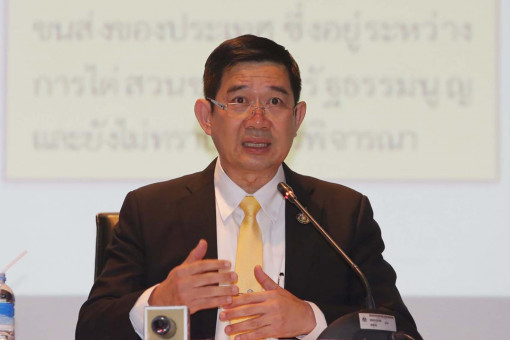NACC warns scheme may break the law

A panel studying the government’s planned 10,000-baht digital wallet handout has warned that the government could break the law if it proceeds with the scheme, according to a National Anti-Corruption Commission (NACC) source.
The NACC formed the panel in October last year to study Pheu Thai’s digital wallet policy amid fears of loopholes allowing corruption.
The panel is chaired by commissioner Supa Piyajitti, who played a key role in probes into the rice-pledging scheme of the former administration of then-prime minister Yingluck Shinawatra.
In its recommendations to the government, the source said the panel stated that the scheme could breach laws that govern elections and financial discipline. Such a warning follows the government’s decision to defer Tuesday’s scheduled meeting on the planned handout at Government House and wait for the NACC’s opinion on the scheme.
The source said what the Pheu Thai Party promised voters during election campaigning last year differed from the details of the scheme announced in parliament.
During the election campaign, Pheu Thai promised to give 10,000 baht to every citizen aged 16 years or older to attract votes, making 56 million people eligible for the money. However, according to the source, the ruling party later unveiled additional conditions that would benefit only 50 million people.
The party had said in campaigning that the scheme would be financed from the national budget. It now plans to raise 500 billion baht in loans to fund the project.
“It is also unclear which agency will be responsible for implementing the scheme,” the source said.
The source went on to say that the changes could breach the election law. The law provides for fines and imprisonment of MPs found guilty of offences.
“Such a policy could also violate Section 73(1), which prohibits election candidates from promising to offer voters assets or other benefits in exchange for their votes,” according to the source.
The source also said that if the government issues a bill to seek a loan of 500 billion baht to finance the digital wallet scheme, this could violate the State Fiscal and Financial Discipline Act because the country showed no sign of being in a crisis that needed such a scheme to urgently shore up the economy.
Section 53 of the law stipulates that the government is allowed to take loans for reasons other than those provided in the law on public debt administration, but only where there is a need for urgent action to address critical problems and where annual appropriations cannot be fixed in due time.
The source said the panel advised the government to review the scheme fully to avoid possible legal violations.
NACC secretary-general Niwatchai Kasemmongkol said Tuesday that the panel had sent the study to the main NACC.
However, the NACC has not forwarded the study to the government yet as it needs to consider its details to see if any additional information is still required, Mr Niwatchai said.
But if the study is sent to the government, it is up to the government to decide whether to proceed with the digital wallet scheme. The NACC only offers recommendations and warnings.
“If the project is implemented and does not cause any damage to the economy or there is no corruption, that will be fine. But if damage occurs, the government must take responsibility,” Mr Niwatchai said.
The Council of State’s secretary-general, Pakorn Nilprapunt, said the government should listen to recommendations from relevant agencies, including the NACC and the Bank of Thailand, before deciding whether to proceed with the scheme.
Deputy Prime Minister and Commerce Minister Phumtham Wechayachai said the digital wallet policy committee postponed its meeting Tuesday as it had to wait for the NACC’s recommendations first.
“The NACC is expected to send the letter to the committee shortly. We have to wait and see. The NACC may have different opinions,” Mr Phumtham said.
He added that the committee may have to wait for Prime Minister Srettha Thavisin to return from Switzerland, where he is attending the World Economic Forum, before the cabinet can meet to discuss the matter thoroughly.

